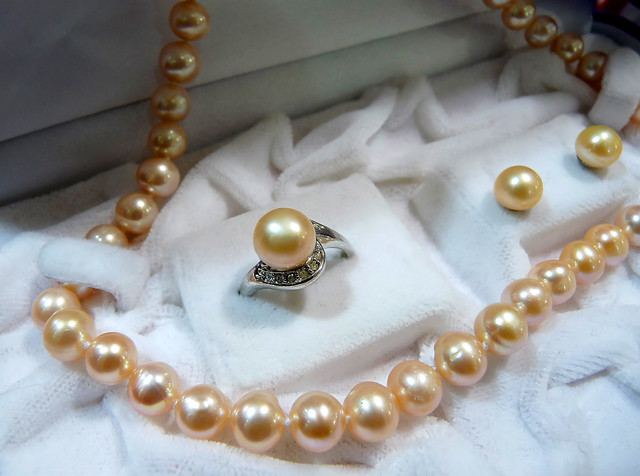Buying Pearls In China
by Cynthia Hicks
The manager of the pearl factory where we stopped on the third day of our tour of Beijing was a great salesperson: I was convinced that the champagne-colored pearl necklace and earrings were exactly right for my complexion. I joined the others in line to pay before getting back on the bus for our next stop at Tiananmen Square.
Taking my seat near the rear, clutching my pearls in their velvet box, I tried to listen to our guide, Han. “Tiananmen Square was named for the nearby Tiananmen Gate, which means the Gate of Heavenly Peace.”
But I couldn’t stay focused. What had I just done? I didn’t have $800 to spend on pearls. I knew nothing about pearls. Did I score a bargain? Did I pay way too much?
My attention returned to our guide, standing at the front of the bus, microphone in hand. He was warning us to not ask him about the pro-democracy demonstrations at Tiananmen in 1989. I remembered reading that soldiers charged with quelling the protest had killed hundreds of Chinese citizens. “We in China were not told about the event. We saw no broadcasts of what was happening. And I am not allowed to speak about it, so please don’t ask.”
His chilling words took my mind off of my buyer’s remorse. At various times on this visit to Beijing, I was struck by the contradictions in the People’s Republic of China. The manager of the pearl factory was an expert salesperson, someone who could thrive in the market economy the Chinese government was effectively establishing. But the market system existed in a tightly controlled society, where the government seemed to have power to determine who among the nearly 1.4 billion citizens could buy, sell, know, be silenced.
The bus came to Tiananmen Square. I watched my step disembarking while listening to Han tell us more about what we were seeing, even as I had to force myself to ignore my stomach, tightening at my own culpability in being sold pearls I couldn’t afford.
“Next to the Monument to the People’s Heroes is Chairman Mao Zedong’s Memorial Hall, the building in the center of the square. The people lined up around it are waiting to see Chairman Mao’s tomb in order to pay their respects as patriotic Chinese.”
Just then, I began to notice several Chinese soldiers, in starched tan uniforms with weapons slung over their shoulders, coming closer to Han, apparently in an effort to overhear him. One of our group, a tall, white-haired woman from Michigan in her mid-sixties, approached Han and loudly asked with a laugh, “So, where did the ‘tank student stand during the democracy demonstration?”
Han picked up his pace, moving quickly away from the woman while saying, “Did you not hear the announcement I made on the bus? Do you think I was teasing?” He was frightened.
I began to wonder what might happen to the pearl factory manager if I tried to return the pearls. Would he be in trouble? Was the pearl factory state run?
I refocused on Han, who was telling us about the Great Hall of the People, a beige rectangular building on the west side of the square, with columns making a futile attempt to break the monotony of the architecture. “The Great Hall was built in 1959 for legislative and ceremonial activities.” He turned 90 degrees. “Looking north, you see Tiananmen Gate, erected in a wall of the Imperial City in 1415.”
Han added, with only the hint of a smile, “The portrait you see of Chairman Mao near the painted gate was added some time after 1415.”
Han’s joke about Mao’s portrait gave me hope. As we began gathering back at the bus, I quietly asked him for help. “I wonder if I can return the pearls.”
“Do you not like them?”
“They’re beautiful, but I can’t spend so much money.”
“The most important thing is that you be satisfied, so, of course, you can return them. I will arrange it.”
Could it be that even in the new market economy of state-controlled China, the customer is always right, that returning a purchase is no more a big deal there than it is here in the U.S.? Han returned the pearls for me and I got my money back. But I will never know what did or didn’t happen to the pearl factory manager.
Cynthia Hicks (cghicks977@gmail.com) is an emerita professor of English from Chabot College, in Hayward, CA. Though she keeps one foot in the education world by consulting with an educational research firm, retirement has given her the time to travel and write again. Cynthia resides in the San Francisco Bay Area.





